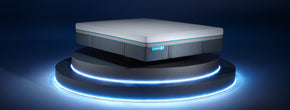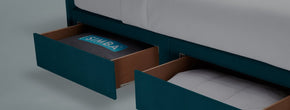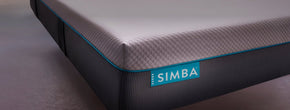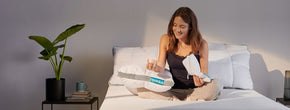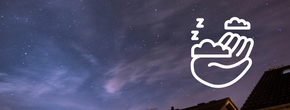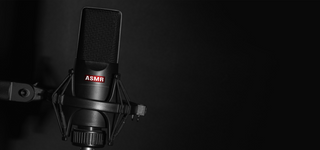Uncovered - Surprising Regional Variations in the Sensory Phenomenon of Sleep ASMR – and there’s one that’s a favourite in the North AND South.
Tired of sleepless nights? Sleep tech firm Simba has delved into the sensory world of ASMR. Listening to the gentle pitter patter of rain has fought off competition to be crowned the UK’s top go-to sleep content.
Rainfall beat soothing tones such as cats purring and soft humming to come top in a study by the sleep technology brand. Whispering, coastal waves and rustling leaves also featured in the list of top knock-out videos that the country regularly turns in a bid to fall asleep in five minutes.
Conversely, the research also quizzed the nation about their ‘most hated’ sleep ASMR sounds, with chewing coming top, with one in five (21%) per cent of those polled saying they ‘despised it’.
So what does ASMR mean?
The term ‘autonomous sensory meridian response’ - or ASMR - very simply is essentially a reaction people have to specific triggers. Coined in 2010, the term describes the pleasant, static-like tingling sensation some people experience in response to specific audio or visual stimuli. Common triggers include soft whispers, tapping sounds and gentle, repetitive movements.
Autonomous Sensory Meridian Response has also been popular on TikTok, with #asmr amassing over 1136.1 BILLION views, and celebrities like Margot Robbie and Miley Cyrus reportedly loving it too.
Revealed: The North-South Sensory Sleep ASMR Divide
There are literally millions of videos dedicated to ASMR, but the study sheds light on distinctive regional preferences when it comes to sleep.
The study - based on responses from over 1000 people who watch/listen ASMR content across the nation - reveals listening to the gentle and rhythmic sound of a cat purring is more likely to help people in the North sleep than people in the South.
But there’s ONE that’s a favourite in the North AND South
Characterised by tranquil music, soft whispers, and calming hands-on care, researchers found that massage is the most mutually loved ASMR content - with one in 4 of those in the North (26%) and South (27%) in the South agreeing it’s the best when it comes to helping them doze off.
The UK favours auditory ASMR in the search of shut eye
Researchers found Brits are twice as likely to turn to sound and audio-based stimuli (28%) over visual-based (13%) - such as slow relaxing hand movements - according to the data.
For 18%, the sound of a person humming is a nightmare. In contrast, one in 8 (13%) praise it for its “lullaby-like” effects - favoured most by those in Newcastle, Norwich and Nottingham.
One of the most common ASMR triggers, gentle whispering, can result in feelings of calmness and relaxation, according to almost one in eight (12%) - most favoured by those in Nottingham.
Nearly one in 5 (19%) say the simple act of someone speaking in a soft, quiet voice slowly into a microphone, have helped with sleep issues.
Residents in Belfast and Glasgow are most likely to listen to the gentle humming motor of a vehicle in the pursuit of rest.
Nottingham locals (18%) are 3 times more likely to say whispering is a favourite ASMR fix for forty winks, than city-dwellers in Sheffield (5%).
Similarly, residents in Liverpool (27%) are 5 times more likely to tune into water dropping content than those in Edinburgh (5%)
According to the data, one in 10 (9%) don’t have to listen to sound. A visual is strong enough to promote an ASMR response. People in Sheffield and Plymouth prefer hand movement based stimuli to help send them to sleep.
Watching someone paint or mix paint can also elicit the tingling ASMR response - favoured most for generating feelings of calm in residents in Edinburgh.
According to Simba’s study, people from Manchester, Norwich and Birmingham are most likely to reach for personal attention ASMR videos where creators make direct eye contact with the camera, placing their hands near the lens as if they were touching your face.
So much so, that personal attention content is 3 times more popular in Manchester (23%) compared to Cardiff (8%).
SLEEP ASMR HOTSPOTS
Simba’s data reveals people across the country notch up nearly two full days (40 hours) each year watching ASMR content in the quest for sleep, with Southampton topping the charts. In contrast, Birmingham relies on it some of the least.
The data — based on responses from over 1,000 people across the nation — reveals almost a quarter (23%) of residents in Southampton average 7 or more hours sleep per night - the minimum amount the NHS recommends for adults (7 hours per night).
In comparison, this figure drops to just 19 percent in Birmingham.
While the scientific understanding of ASMR is still evolving, some studies suggest that it may be linked to the release of endorphins and neurotransmitters, promoting a sense of relaxation and well-being.
According to Simba’s research, a third (33%) have seen an improvement in their sleep after turning to the relaxation technique.
“While little is known on the subject right now, neurological factors, such as differences in brain structure and neurotransmitter activity, may contribute to individual variations in ASMR sensitivity and preference.” says Lisa Artis, deputy CEO at Simba's charity partner, The Sleep Charity.
“It's fascinating to see how local vibes—like everyday sounds, traditions, and even the weather—could shape what gives us that perfect ASMR experience. It's a bit like choosing your go-to film genre; some people vibe with role plays and stories, while others find comfort in those soothing, repetitive sounds.
“Just like finding your film niche, ASMR is all about personal preference. Whether you lean towards storytelling or the tranquil simplicity of repetitive sounds, it’s all about experimenting. And in the spirit of discovering your ideal chill zone, Simba has introduced the Sleep Symphony ASMR, which you can check out on their website.”
How does ASMR work and what are the Benefits?
In essence, ASMR appears to operate by triggering a combination of neural and physiological responses, contributing to a sense of calm and well-being. According to a study published in the journal PLOS One, ASMR triggers, such as whispering and tapping, activate the brain's reward system, releasing endorphins and promoting relaxation.
Another study suggests that ASMR experiences are linked to the parasympathetic nervous system, leading to a reduction in heart rate and stress levels. Researchers at the University of Sheffield have also explored how ASMR videos on platforms like YouTube contribute to positive mood enhancement and stress relief.
“The interplay of lowered cortisol levels, slower heart rate, and the engagement of brain areas linked to pleasure and relaxation can make ASMR a helpful natural sleep aid”, explains Artis
Brewing Up Dreams - How Cultural Traditions May Steep Into Our Sleep ASMR Choices
According to Simba’s data, regional traditions and customs may contribute to the popularity of specific sleep ASMR choices.
The research revealed that people in Leeds - an area associated with strong tea-drinking traditions - are three times more likely to seek comfort and brew up relaxation from ASMR videos featuring the sounds of tea brewing in contrast to people from Southampton.
Environmental Factors May 'Set the Scene' for our Dreamy Sleep ASMR Habits
Environment may also play a role in shaping sensory preferences according to Simba’s study. People living in coastal settings such as Plymouth and Brighton were more likely to find solace in ASMR videos featuring waves, than those in more urban settings such as Nottingham or Birmingham.



